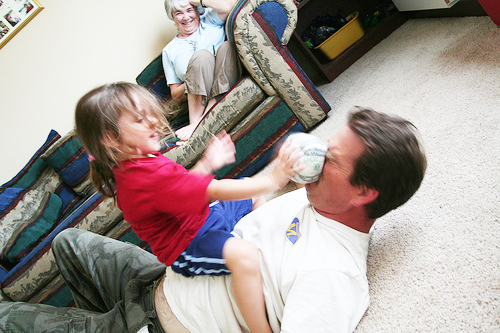- South Texas Students Meet Accordion Music Icons Los Tigres Del Norte In Edinburg Thanks To Khs America/Hohner Alianza Académica Initiative
- Fragile Planet Offers a Nighttime Wildlife Experience
- Falcons Soccer Off & Running
- Cameron County Receives Funds to Improve Two Parks
- Falcons Complete First Half of 32-6A
- School District to Help out Victims of California Wildfires
- Sand Castle Days Continued Despite Unexpected Weather
- Ready for District
- Discussion of Garbage Dumpster Rates, Agreements Between State & City on Highway Regulations, and More
- 31st Annual Shrimp Cook-Off is Right Around the Corner
Letting Kids Be Kids
- Updated: September 27, 2013
The Benefits of Roughhousing
by John Michaelson
AUSTIN, Texas – It is an order that has passed through the lips of many a parent: “Quit that horsin’ around!” However, a better option may be to loosen the reins a bit, according to one expert.
Larry Cohen is a licensed psychologist who encourages roughhousing. He said physical engagement between children gets them some of the physical activity they need and can also help with mental and emotional development.
“There’s been some research that children who do more roughhousing at home and with their peers, they do better in school,” Cohen said. “They have more emotional intelligence, which is basically knowing your own emotions, understanding them and being able to read and understand other people’s emotions.”

At times it can seem little more than controlled chaos, but when it comes to roughhousing, be it peer to peer, or parent and child, there are numerous benefits. Photo: Sharon Mollerus
Roughhousing can also help build bonds between parent and child, Cohen added.
“We kind of think of roughhousing sometimes as a free-for-all, but you actually have to tune in to each other, and that’s great for building a connection. In our society now, we are just pushing children so hard to achieve and perform, and they don’t get enough time to just roll around on the floor,” he said.
When it comes to the issue of roughhousing and safety, Cohen said he prefers supervision and knowledge, rather than too many rules. It’s an approach that really set in when Cohen’s daughter was younger and climbing around at a playground, and he kept telling her to be careful, over and over.
“My friend said ‘You know Larry, she’s gonna recover more easily from a broken arm than from being timid and fearful her whole life,’” Cohen recalled. “Yes, there’s a risk that a child could get hurt, but a loss of an adventurous spirit, a loss of excitement, a loss of confidence is worse than a broken arm.”
Cohen, who wrote “The Art of Roughhousing,” said for children, especially those who are shy, roughhousing and wrestling around can be one way to help build inner confidence.
More information is available online at www.attachmentparenting.org.
